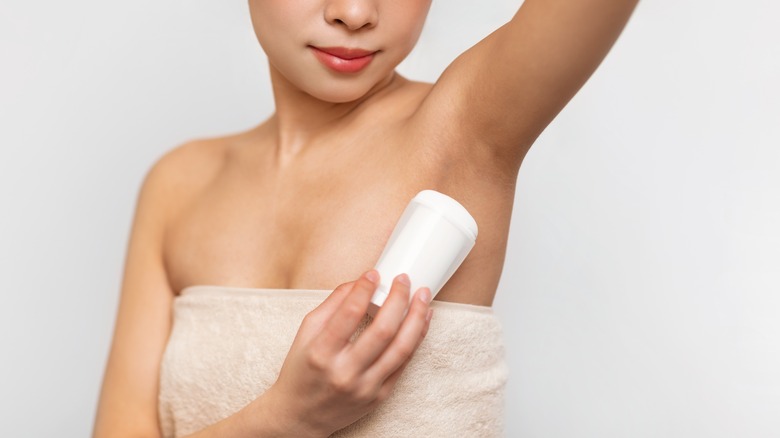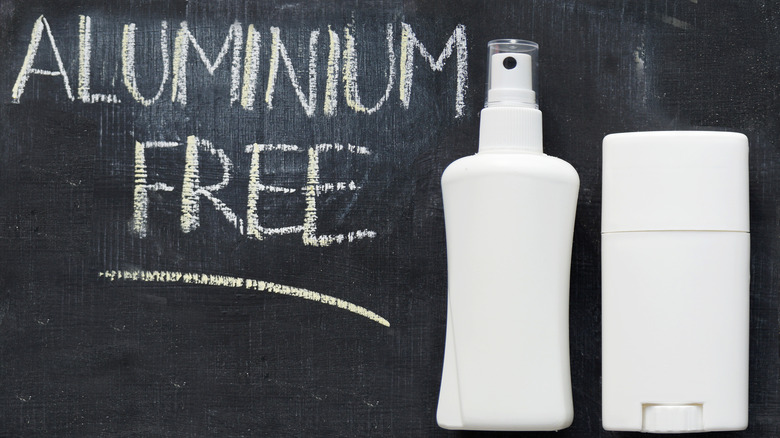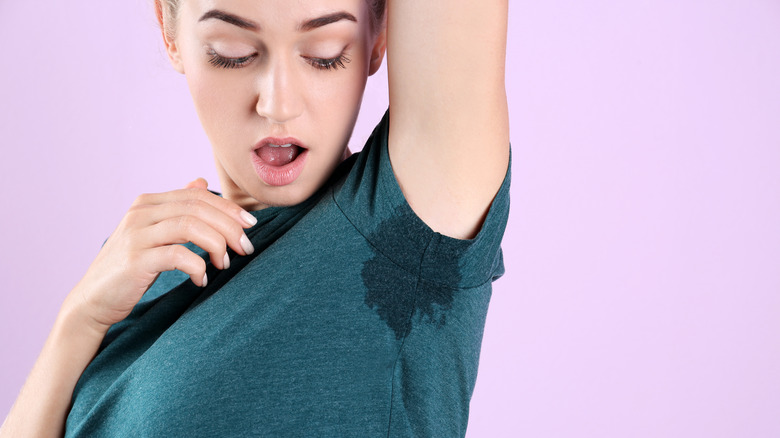Do You Really Need To Worry About Aluminum In Deodorant?
Putting on deodorant before you step out of your home for the day is probably one activity you don't really think about much. In fact, it's likely a very normal part of your morning routine. When you run out of it, you can head to the pharmacy or grocery store and peruse through a plethora of brands. Something you'll see a lot of at the deodorant aisle these days are products labeled "aluminum-free." In fact, there might be more of those brands than aluminum-based ones, making you wonder what all the fuss with aluminum is about.
Aluminum is a common ingredient found in underarm products that is known to prevent sweating. In fact, the correct term for underarm products that contain aluminum is antiperspirants because deodorants don't necessarily contain this chemical (via Byrdie). Deodorants actually work by masking the smell of odor, while antiperspirants actually prevent the sweat glands from producing perspiring, per Teen Vogue.
With the armpit detox trend that swarmed the internet earlier this year came a renewed focus on what kind of ingredients we are exposing our bodies to, and aluminum became an ingredient of interest once again. The chemical has been controversial for a number of reasons, with its alleged link to cancer and Alzheimer's disease being one of the largest. But, is there really a need to worry about aluminum in your deodorant?
There is no cause for worry with aluminum in deodorant
Despite widespread promotion of "natural" and "aluminum-free" brands, according to dermatologist and skin care expert Andrea Suarez, aluminum is as natural an ingredient as any (via Dr. Dray). The term "natural" is a vague and unregulated one, she explains. Traces of aluminum are found in a lot of the things in our environment, and we ingest the chemical through food and other sources like utensils we use in the cooking process, shares cosmetic formulator Vanita Rattan, who is an advocate against the myth that the absorption of the chemical through antiperspirants causes cancer (via YouTube).
While a 2003 study published in the European Journal of Cancer Prevention suggested a link between aluminum and breast cancer, the findings of the study were ultimately dismissed as they were inconclusive and couldn't be proven (via Good Housekeeping). In fact, in March of 2020, the Scientific Committee on Consumer Safety (SCCS), which is the body that advises the EU Commission on health and safety risks of non-food consumer products, put out a final decision on the safety of aluminum in cosmetics products and termed it safe in antiperspirants and other products like lipsticks and toothpastes.
Even when it comes to Alzheimer's disease, there is no conclusive data to suggest a link between the two, according to director of Scientific Programs and Outreach at the Alzheimer's Association, Keith Fargo (via Teen Vogue). There are newer studies that say there's no connection whatsoever.
At the end of the day, deodorant use depends on your needs
Maybe your desire is to avoid wet patches under your armpits, or perhaps you want to just stop using deodorant altogether. The decision should be based on your comfort and need. There is no reason to switch to supposedly more natural underarm products for fear of aluminum, says dermatologist Joshua Zeichner. "If wetness is an issue, then I do recommend aluminum-based antiperspirants," he explains, adding that aluminum-free options might be the right way to go if body odor is your key concern (via Good Housekeeping).
What trends such as the underarm detox and the search for natural ingredients in labels actually show is that people are starting to care more about their health in general, reports Teen Vogue. "With increasing evidence that certain ingredients in the beauty industry are linked to health complications, customers are demanding better, more natural options," adds founder of beauty brand Lavanila, Danielle Raynor.
While you don't need to throw away underarm products that contain aluminum, you could pay closer attention to newer and more sound scientific research and perhaps keep an eye on those labels.


